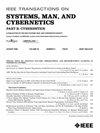Face Image Modeling by Multilinear Subspace Analysis With Missing Values
IEEE Transactions on Systems Man and Cybernetics Part B-Cybernetics
Pub Date : 2009-10-19
DOI:10.1145/1631272.1631373
引用次数: 74
Abstract
Multilinear subspace analysis (MSA) is a promising methodology for pattern-recognition problems due to its ability in decomposing the data formed from the interaction of multiple factors. The MSA requires a large training set, which is well organized in a single tensor, which consists of data samples with all possible combinations of the contributory factors. However, such a “complete” training set is difficult (or impossible) to obtain in many real applications. The missing-value problem is therefore crucial to the practicality of the MSA but has been hardly investigated up to present. To solve the problem, this paper proposes an algorithm named M2SA, which is advantageous in real applications due to the following: 1) it inherits the ability of the MSA to decompose the interlaced semantic factors; 2) it does not depend on any assumptions on the data distribution; and 3) it can deal with a high percentage of missing values. M2SA is evaluated by face image modeling on two typical multifactorial applications, i.e., face recognition and facial age estimation. Experimental results show the effectiveness of M2 SA even when the majority of the values in the training tensor are missing.基于缺失值的多线性子空间分析人脸图像建模
多线性子空间分析(MSA)能够分解多因素相互作用形成的数据,是一种很有前途的模式识别方法。MSA需要一个大的训练集,该训练集在单个张量中组织得很好,该张量由具有所有可能的促成因素组合的数据样本组成。然而,在许多实际应用中,很难(或不可能)获得这样一个“完整”的训练集。因此,缺失值问题对MSA的实用性至关重要,但迄今为止几乎没有研究过。为了解决这一问题,本文提出了一种M2SA算法,该算法具有以下优点:1)继承了MSA分解交错语义因素的能力;2)不依赖于对数据分布的任何假设;3)它可以处理高百分比的缺失值。在人脸识别和人脸年龄估计两种典型的多因素应用中,通过人脸图像建模来评估M2SA。实验结果表明,即使在训练张量中的大部分值缺失的情况下,M2 SA算法仍然是有效的。
本文章由计算机程序翻译,如有差异,请以英文原文为准。
求助全文
约1分钟内获得全文
求助全文
来源期刊
自引率
0.00%
发文量
0
审稿时长
6.0 months

 求助内容:
求助内容: 应助结果提醒方式:
应助结果提醒方式:


